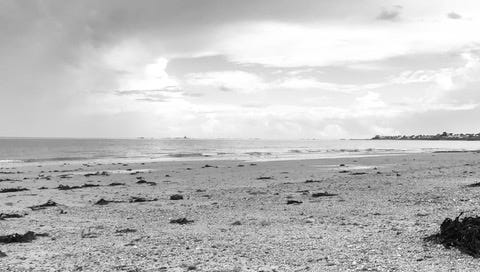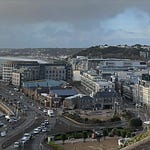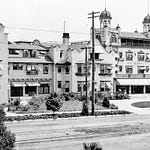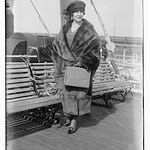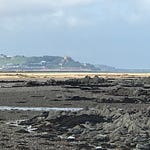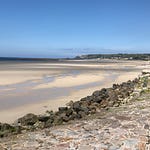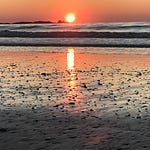This week’s story tells of a shocking Victorian tragedy that unfolded in Grouville bay. It is a sobering read, and of course is based on a true event. I have imagined it from the perspective of a watcher, surveying with a telescope from the shore. ~ Paul Darroch
A Watcher - La Rocque, Jersey
Monday, 30 July 1844
It is a terrible thing to chance death for a haul of seaweed. Yet this is high summer in Jersey; vraicing season. Horses and carts muster on the seashore, so the gatherers can fill their boots. They wheel their wagons out deep into the Grouville moonscape and shovel them high with stinking seaweed. It’s the finest manure in the world, worth its weight in gold. Then the plunderers race back to the shore before the incoming tide drowns them. It’s a hazardous endeavour.
The outermost rocks too are fair game; approached by boat, scoured by hungry hands. This morning the Laurel set out from Gorey Harbour to scrape them bare. That’s Mr Pallot’s little cutter, ferrying sixteen men and three women. They were eager to shear the vraic from La Conchière, the farthest rock in Grouville Bay.
The writing-desk in my study at La Rocque overlooks the scene, and from my telescope I surveyed the terrain, as barren as the surface of Mars. The sun smiled down benignly, as the sea drained away below. I saw the little craft moor on the windward side of the rock, its nose touching it. A somewhat foolhardy manoeuvre, I observed.
The sea spilled away, as if the cork in a bathtub had been removed. A rugged moonscape revealed itself, dripping with the precious harvest. They must have toiled all morning in the gorges of this drowned world, hauling in vraic till their hands were sore. I stopped by my telescope from to time to time to watch their pile of manure grow; it would doubtless sell for handsome coin.
As afternoon drew to a slow end, their cutter was piled high, with a mound of black seaweed weighing it low in the water. Silently, the tide turned and resumed its advance, climbing up the crevasses, submerging the rocks. Like Noah’s Ark as the flood rose, the Laurel floated.
They had been toiling long and hard under fair skies, but now the weather had spun on a penny, and a line of soot smeared the skies, a gale tearing in from the west-north-west. The palms in my garden swayed in the rising breeze and my glasshouse rattled. The sky furrowed the colour of indigo. I stayed gripped to my telescope.
I watched as a black funnel of rain crashed into the bay. The sky bellowed like a hammer beating lead. The vraicing crew had lingered moments too long. In seconds, the Laurel splintered like matchwood against La Conchière rock. I watched as Captain Pallot ushered his passengers out of the stricken boat. They clambered back onto the reef. Whipped by the storm, the tide was surging in. The moonscape was flooding fast; their world was rapidly drowning. Other boats desperately tried to help but could not come close.
I stormed out into the rain and called out for Philippe Marie, the best pilot in La Rocque. He and his son made ready their boat to help, but the sea was violent and impassable. At last, just as the hour struck five, he was finally able to push out against the storm. Then I retreated indoors, and from the comfort of my observatory, through the raindrops that lashed at the windowpane, I watched the terrible last act of the drama on the horizon.
Men and women clung like limpets over shrinking scraps of rock. The waters had submerged almost all of the reef and now encircled La Conchière itself. I counted six souls on the summit of the rock, four men and two women. They stood in a circle, holding hands. Perhaps they were praying, perhaps they were singing. It was hard to tell at this distance.
The rescue cutter limped painstakingly towards them across the bubbling cauldron of the bay. It would arrive too late. A black sheet hung above the little fellowship at La Conchière, like a shroud. The six men and women clutched each other for the last time. Then there was a terrible churning, a violent explosion of foam. When the spray cleared, the rock had been swept bare.
Captain Marie’s rescue boat limped into port at nightfall, and its deck was almost empty. All the women had been lost, and the lion’s share of the men. Of the nineteen souls who Pallot had ferried to cut vraic at La Conchière, fourteen would never come home. I whispered a prayer for them as I put away my telescope, as a stormy and starless night fell over the scene of the tragedy.
It would take two months for the last body to drift ashore.
(c) Paul Darroch 2021

